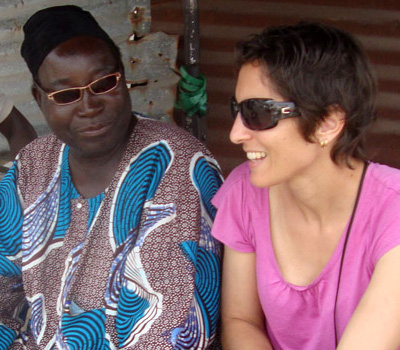How identity becomes a source of conflict or growth
Religious violence and ethnic discrimination are global phenomena. Therefore, by exploring how similarly or differently these phenomena work in various parts of the world, we can better understand when and how identity becomes a source of conflict or growth. Dr. Claire Adida, of the University of California, San Diego researches when and why differences emerge among ethnic groups and when and why those differences matter for political and economic development. This theme has guided her research agenda which is comprised of three broad projects with varying implications.
Her research on Muslim immigrants to Europe sheds light on why these groups are failing to integrate into their host societies, which in turn helps understand why some might turn to radicalism or violence. Her work in West Africa also digs into the foundations of social disintegration and instability, by researching how people's ethnic and religious identities are exploited for political and economic gain. Finally, her work with mobile technology relies on networks of trust within ethnic groups to encourage adoption of new technology. In many ways, Dr. Adida's work identifies, at the micro-level, some of the prerequisites to peaceful, stable, and growing societies.
Dr. Adida's current research includes:
- The Ebola Outbreak: One of Dr. Adida's latest projects attempts to track and understand the American public's response to the current Ebola outbreak and its politicization by the media and political leaders alike into an immigration problem. Through survey waves, this research effort will track American attitudes toward, and knowledge of, Ebola as the outbreak progresses; furthermore, it will test how the American response varies with issue framing (as a public health problem, as an immigration problem, etc...), and how political ideology and partisanship influence this response. This effort is one of the first to systematically track public opinion as it responds to a public health issue; by doing so, we not only learn about attitudes toward Ebola and the outbreak, we uncover how such issues become politicized over time.
-
Integration of Muslim immigrants in France: Existing research, excluding that of Dr. Adida's, has been unable to demonstrate the ways in which discrimination against Muslim immigrants specifically differs from that of Arab immigrants. Dr. Adida's research therefore works to show discrimination against Muslims as Muslims, and furthermore, the challenges Muslim immigrants face in trying to integrate into their host societies in Europe.
-
How ethnicity shapes politics and conflict in West-Africa: Dr. Adida tries to explain when and why ethnic and religious differences become problematic for democracy and stability and offers a lens from which to better understand how some West-African countries spiral into conflict and become fruitful environments for insurgent and terrorist groups. Dr. Adida is currently conducting research in Nigeria, Benin, Ghana, and Niger.
-
Technology and development in West Africa: Migrants who leave their village and succeed in the capital city face obstacles that prevent them from being able to send money back home or limit the amount they are able to send. Dr. Adida is investigating if and how technology may be used to foster home-grown solutions to development in Africa. In collaboration with the California Institute for Telecommunications and Information Technology and with local mobile phone companies in West Africa, Dr. Adida and her team are developing and evaluating mobile-based technology to help migrants send money back home securely and affordably. Dr. Adida hopes this project will allow family members to send money directly to institutions such as schools, allow more transparent international financial support, and improve the everyday lives of those in West Africa.
Bio
Claire Adida is an Assistant Professor in the Department of Political Science at the University of California, San Diego. She received her Ph.D. in political science from Stanford University in 2010. Her research is in Comparative Politics, and more specifically in the study of ethnicity and identity, government and non-state provision of public goods, inter-group cooperation and violence, and trust and informal institutions. Her work has been published in Comparative Political Studies, Proceedings of the National Academy of Sciences, Journal of Population Economics, and Economics and Politics. Her book, "Immigrant Exclusion and Insecurity in Africa"(Cambridge University Press 2014) offers one of the first systematic analyses of the immigrant experience in a region that experiences large flows of voluntary migration.
Dr. Adida is the daughter of French Jews who were themselves the children of French-Algerian and Hungarian Jews during World War II. Immigration and identity have therefore uniquely shaped her life. As she gained greater awareness of the ways in which individuals are shaped by their experiences, she was led to seek further understanding of the powerful ways in which identity motivates individuals as they seek security and economic well being.
Website: http://claire.adida.net


